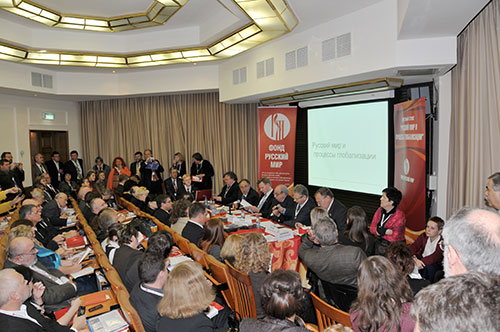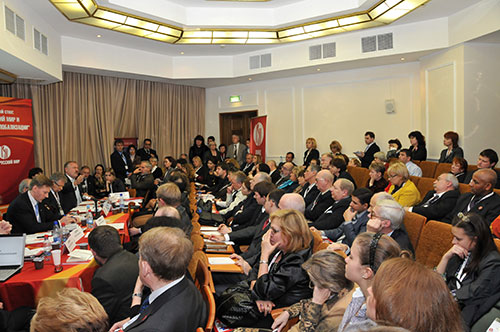
Roundtable on “Russkiy Mir and Globalization Processes”
/ Главная / Russkiy Mir Foundation / News / Roundtable on “Russkiy Mir and Globalization Processes”Roundtable on “Russkiy Mir and Globalization Processes”
05.11.2008
Russian historians, political analysts, representatives of the Russian diaspora and representatives of the Russkiy Mir Foundation took part in the roundtable discussion “Russkiy Mir and Globalization Processes”, which was held as part of the Second Russkiy Mir Assembly. The speakers included Director of the Institute of Ethnology and Anthropology of the Russian Academy of Sciences Valery Tishkov, First Deputy Chairman of the Committee on CIS Affairs and Relations with Compatriots Konstantin Zatulin, Director of Russian and Asian Programs at the Washington Center for Defense Information (the World Security Institute) Nikolay Zlobin, members of the Russkiy Mir Foundation – Director of Regional Programs Division Georgy Toloray and Regional Director for European Programs Alexey Gromyko, and a member of the foundation’s board of trustees, head of the Paris office of the Institute for Democracy Natalya Narochnitskaya.
The moderator of the roundtable, Director of the Institute of Global History at the Russian Academy of Sciences Alexander Chubaryan, noted that “the topic of globalization is global”. However, the most heated fierce disputes focused only on several key issues: the situation with the Russian language and culture and the state of compatriots in post-Soviet countries.
Valery Tishkov spoke about the main trends which he believes characterize the current state of the Russian world. He pointed out three trends: assimilation, downgrading of Russians to the level of a minority deprived of rights, and transferring of the center of power to Russian-speaking citizens in a number of states.
The first two trends are not promising, the ethnologist believe. The natural barrier on the way of the Russians’ assimilation is the existence of the large Russian core – the population of Russia, which is why all the attempts to assimilate Russian-language people in the CIS countries, particularly in Ukraine, are not realistic. The second trend, which is now a dominant in the post-Soviet arena, is not very promising either, Tishkov said, since the future belongs to states with two communities of equal status. Finally, in a number of states the Russian-speaking population has good chances to “win back the center of power” given the favorable demographic situation.
On the whole, today the situation with the Russian world is not so dramatic as it was, for example, 5-7 years ago, Tishkov believes.
The rather quiet report of the first speaker was followed by quite an emotional speech of Konstantin Zatulin, who said that the Assembly is another occasion to “clang the bell”. He passionately called for the present to stop “multiplying words” about the Russian world, and outlined the main task he thinks is facing the Russkiy Mir Foundation: not to allow narrowing of the field of the Russian language and culture usage. He thinks that the state of the Russians abroad continues worsening, and the issue is especially vital for language and political competition in Ukraine and Kazakhstan, where the sphere of using Russian goes on reducing, and Russians are squeezed out from “commanding heights” in policy and economy. The exit from the situation is in certain actions that can not be put off, in particular in active confrontation to local ideological propaganda which bases on crating anti-Russian historical myths.
Konstantin Zatulin made his thesis even sharper while responding to the next reported, politic expert Nikolay Zlobin. The discussion was generated by the statement that it is necessary to separate the Russian world and policy in order to build an attractive and competitive model, which is especially topical now days when no one dominating socio-politic model of society remained in the world. In this respect, there should be no ideological component, otherwise the Russian world will be too dependent on environmental changes in Rusian policy, Zlobin believes. He agreed that excessive politicization like attempts to make Russian compatriots abroad vote for the “right party”, is harmful. At the same time, Zatulin noted that the element of politic struggle can not be excluded when one speaks about the Russian world, since the struggle for keeping the Russian language in the CID is now a part of large policy.



On his part, chairman of the All-Ukrainan Council of Russian Compatriots Vadim Kolesnichenko, believes that conducting various cultural events is not enough since in Ukraine a genocide of Russian people and a consistent liquidation of the Russian-language information space are taking place. The support of the Russian culture in Ukraine is a task for the state policy, and in this respect the struggle for the Russian world in Ukraine is nothing but a politic issue, Kolesnichenko believes. Natalya Narochnitskaya who joined the discussion later pointed at the self-organizing of the Russian world abroad, which she thinks is the example of overcoming of “pure” policy.
Reports of the members of the Russkiy Mir Foundation were in a considerable measure a reply to the speech of Konstantin Zatulin and Nikolay Zlobin. Georgy Toloray thinks that Russia’s strength today is not in policy or economy, but in the mighty cultural tradition. Realizing this fact, we should count exactly on the promotion of the Russian culture, tripling efforts in this direction. He thinks that it is impossible to handle all the problems of the Russian world, but the foundation makes certain actions, opening Russian centers and implementing a grant program. That is the certain work aimed at the future, which will definitely bring results, though probably not immediate ones. Alexey Gromyko supported his colleague, and reminded about the non-political character of the foundation’s activities. He also noted that the practice of “small actions” is the key to achieving the targets.
Many of the reporters spoke about certain projects which are being implemented and need the state support. For example, Director of the London School of Russian Language and Culture Olga Bramley talked about a net of Russian schools in Europe that need a constant state support. Director of a Russian school in Rome Natalya Pereyaslavtseva spoke about the importance of Russia’s state support both financial and ideological.
A lot of attention was paid to the question how and on what basis the Russian world can be united. Alexey Gromyko’s attempt to define what is “being Russian”, which he believes can not be restricted by narrow confessional or ethnic limits, raised sharp criticism: many of the reporters said that it was necessary to admit the fact that the Russian culture is first of all the culture of the Russian ethnos and Russian people, and the attempt to make “Russian” a collective concept for various peoples and cultures are not convincing and give no special preferences to the International competition of civilizations.
The participants of the discussion also suggested certain measures to unite the Russian world. Some of the reporters noted the importance of supporting the Russian-language foreign media. Zlobin believes that the Russian world must learn to integrate itself into the global system and be ready for serious competition. So far, Russia is absolutely unable to meet competition: it virtually stays away from the global information market and hence easily loses in contemporary information wars.
Rather exotic was one of the reporters’ suggestion to create consumer cooperatives as a method to unite the Russian world, as well as a suggestion to promote Russia’s competitive products with Russian-language labels on the global market, which would help in promoting the Russian language, the reporter said.
Perhaps the most heated dispute, along with the discussion of whether the defense of Russian compatriots and Russian culture in the CIS should be politicized, was the discussion around Nikolay Zlobin’s another statement. Speaking about the tasks facing the Russian world, he noted that Russia should stop demonstrating its peculiarity constantly referring to Russia’s own historic traditions: many peoples believe their own history no less peculiar and the global community is therefore not very impressed by this argument. The conversation about the Russian world is first of all the conversation about the future, not about the past, it is an attempt to find its place in the future world order. Gromyko objected to him, saying that the problem of the Russian world is exactly in the fact that we too little refer to our culture and history, and this is why the world has very poor knowledge of it. In his turn, Zatulin stressed that it is impossible to thinks about the future of the Russian world without looking back to the past. Natalya Narochnitskaya noted that even though we “have enough sins”, we should not support “historic inferiority” complex in ourselves. On the contrary, we must boldly urge Western intellectuals to talk about the principal universal values, such as freedom, for which we have a no less right than the Europeans, Narochnitskaya said. She believes that the peculiar “Russian view”, “Russian world view” has the right to exist, and the Russian language has a full-fledged apparatus for a philosophic understanding of the world.
The participants of the round table have hardly managed to turn each other to their views. On the contrary, the discussion has demonstrated once again that there is still no consensus even on matters of principal: what model of the Russian world do we need? What tools should be used to defend and support the Russian culture abroad? What unites us? What is the Russian world after all – what formula expresses this phenomenon in its full? However, it is wishful to believe that the exchange of opinions was rather useful. The Russkiy Mir Assembly’s main target was not to reach a common like-mindedness. It was important to bring together compatriots again, offering them an opportunity to speak about their work, to discuss vital issues. Not everyone though, but many of the participants managed to make a report. During such meetings, not only polarization of views takes place, but crystallization of views, and as a result the main and common things uniting the Russian world are defined.
News by subject
Publications

 Mikhail Kalatozov, a director who transformed the world of cinematography in many ways, was born 120 years ago. He was a Soviet film official and a propagandist. Above all, he was capable of producing movies that struck viewers with their power and poetic language.
Mikhail Kalatozov, a director who transformed the world of cinematography in many ways, was born 120 years ago. He was a Soviet film official and a propagandist. Above all, he was capable of producing movies that struck viewers with their power and poetic language.